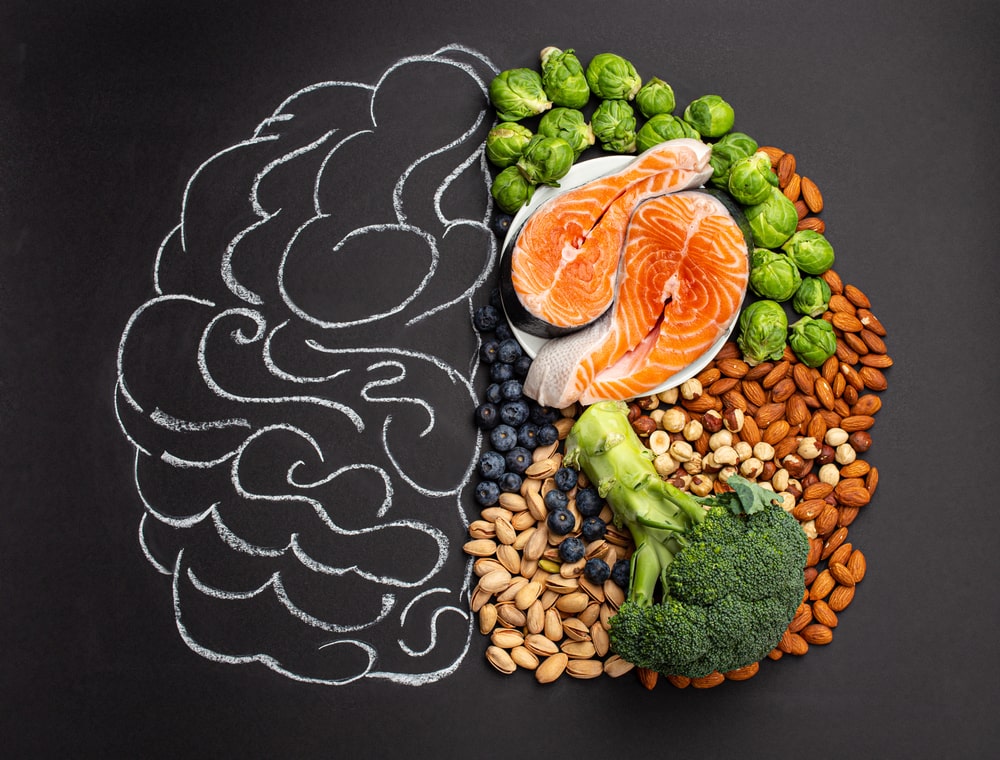Boost Your Brain Power with These Foods
by Amy Lawson

Did you know that your diet can significantly impact your brain health? It’s true! The foods you eat can enhance your mood, sharpen your focus, and help maintain cognitive function as you age. In this post, I’ll explore six brain-boosting foods that can help you perform at your best, whether you’re a student prepping for exams, a professional aiming to enhance productivity, or simply someone who wants to maintain sharp cognitive function as you age.
Blueberries
Blueberries are at the top of our list for a reason. They’re packed with antioxidants, flavonoids, and essential vitamins and minerals. A 2021 study found that blueberries contain more antioxidants than any other fruit! Research shows that women over 70 who consumed at least two half-cup servings of blueberries or strawberries weekly experienced slower mental decline, translating to up to 2.5 years of delayed aging. For school-age children, blueberries have been linked to improved memory and executive function.
How to Enjoy: Toss fresh or frozen blueberries into your morning oatmeal, blend them into smoothies, or mix them into yogurt for a delicious snack. You can even bake them into muffins for a tasty treat.
Avocados
If you love guacamole or avocado toast, you’re in luck! Avocados are not just tasty; they’re also beneficial for brain health. They contain lutein, a carotenoid linked to cognitive benefits, as well as monounsaturated fats and B vitamins. Studies show that consuming avocados is associated with better memory performance.
How to Enjoy: Spread avocado on whole-grain toast, add it to salads, or blend it into smoothies for a creamy texture. When shopping for avocados, choose ones that are dark brown and slightly soft if you plan to eat them soon.
Leafy Greens
Incorporating leafy greens like spinach, kale, and broccoli into your diet can be a game-changer for your brain. Just one serving of leafy greens daily can significantly boost brain health. A study found that individuals who ate seven servings of dark leafy greens weekly experienced a 32% slower rate of cognitive decline.
How to Enjoy: Add spinach to smoothies, toss kale into salads, or sauté Bok Choy as a side dish. You can also add greens into soups and stews for an extra nutrient boost.
Citrus Fruits
Citrus fruits such as oranges, grapefruits, and lemons are not just refreshing; they also offer cognitive benefits. A study published in the British Journal of Nutrition found that older adults who ate citrus fruits daily were 23% less likely to develop dementia compared to those who consumed them less frequently. Mandarin oranges are particularly beneficial, but other citrus fruits like oranges, grapefruits, and lemons also offer protective flavonoids that combat inflammation and support brain health.
How to Enjoy: Enjoy citrus fruits as snacks, add slices to your water for flavor, or make fresh juice. Try incorporating zest into your recipes for added flavor and nutrients.
Coffee and Tea
A UK study found that adults who drank two to three cups of coffee or three to five cups of tea daily had the lowest likelihood of dementia or stroke (Zhang et al., 2021). The polyphenols in coffee also contribute to its neuroprotective, anti-inflammatory, and antioxidant benefits (Porro et al., 2024).
How to Enjoy: Brew your favorite coffee or tea in the morning and coffee works great as a chocolate enhancer in certain desserts.
Fatty Fish
Fatty fish, such as salmon and mackerel, are rich in omega-3 fatty acids, particularly DHA, which is crucial for brain function. Omega-3s have been shown to enhance learning, memory, and overall cognitive well-being. Additionally, they may help mitigate Alzheimer’s disease risk, especially for those with high stress exposure. Aim to include fatty fish in your diet a couple of times a week.
How to Enjoy: Aim to include fatty fish in your meals a couple of times a week. Grill, bake, or pan-sear salmon, or try tuna in salads or sandwiches.
Bonus Tip: The MIND Diet
If you’re looking for a structured way to promote brain health, consider the MIND diet. This eating plan combines elements of the Mediterranean and DASH diets, focusing on foods that support cognitive function. Here’s a quick overview:
- Whole grains: 3+ servings daily
- Vegetables: 1+ serving daily
- Dark leafy greens: 6+ servings weekly
- Nuts: 5+ servings weekly
- Beans: 4+ meals weekly
- Berries: 2+ servings weekly
- Poultry: 2+ meals weekly
- Fish: 1+ meal weekly
- Olive oil as the main fat source
And it’s best to limit sweets, red meat, cheese, fried foods, and butter. This eating pattern is designed to protect the brain by reducing oxidative stress and inflammation.
Conclusion
Incorporating these brain-boosting foods into your diet can help improve memory and combat cognitive decline, keeping your mind sharp as you age. The key is to make small, sustainable changes that you can stick with over time. What’s your favorite brain-friendly food? Share your thoughts in the comments!
Connect with More Dietitians in Colorado
- Arvada
- Black Hawk
- Buena Vista
- Centennial
- Colorado Springs
- Conifer
- Crested Butte
- Denver
- Elizabeth
- Fort Collins
- Fountain
- Littleton
- Longmont
- Parker
- Thornton
Images: From Unsplash and Pexels
The Site is not intended to be a substitute for professional advice. Under no circumstances will we be liable for any loss or damage caused by your reliance on information obtained through the Site. You are responsible for evaluating the accuracy, completeness, or usefulness of any information, opinion, advice, or other content available through the Site. Please seek the advice of professionals, as appropriate, regarding the evaluation of any specific information, opinion, advice, or other content. Never disregard professional advice, including medical advice, or delay in seeking it because of something you have read on this Site.



